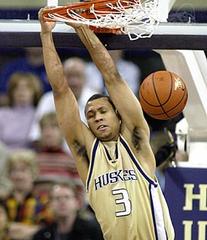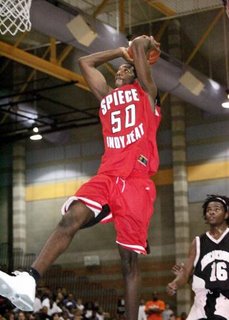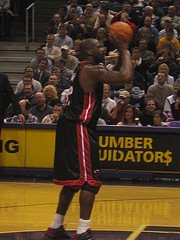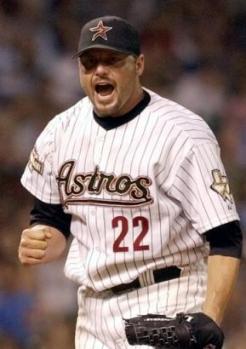NBA Draft Winners, Losers, and Steals
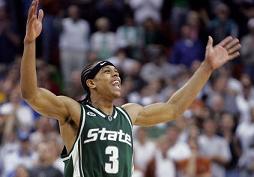
The Draft just ended, but I have to throw down my immediate thoughts on the action.
Winners:
- Memphis. I'm not a Rudy Gay fan, but the Grizzlies still had a great draft. To bring back Swift, snag a guy that was at one time the top player on the board, pick up Kyle Lowry (will end up being the best PG in this draft), and then top it off by absolutely stealing Alexander Johnson (should have gone in the top 20) ... that is an unbelievable night. Prediction: Memphis will not be swept in the playoffs next year.
- Portland. When was the last time the Blazers had a good draft? It's been so long that the ESPN crew didn't realize the shift and kept berating them like it was 2000-2005. It was amazing to sit there and listen to Greg Anthony and Stephen A. Smith criticize Portland after they had made some impressive moves. To turn the #4 pick and Sebastian Freaking Telfair into Aldridge and Roy is some amazing work. Throw in Dritz's boy Freeland and Spanish Chocolate and the Blazers are finally showing signs of life. I really think they got the two best players (at least for the short term) in the draft.
- Cleveland. For a team with a late first round pick and a second round pick, the Cavs hit this one out of the park. Daniel Gibson underachieved last year at Texas, but there's a reason he was once a top five projected pick - he can play. The knock on him is that he's not a pure point, but when you have LeBron, the reality is that he's going to initiate the offense most of the time anyway. I think Gibson is a fantastic pick. And don't even get me started on Shannon Brown. I LOVE this guy. My brother, Drew, said the other day that all he wanted from this draft was for the Cavs to get Brown. Mission accomplished. The Cavs just gained 7 wins by drafting these guys. Goodbye Eric Snow crunchtime minutes, goodbye Flip Murray bricks.
- Chicago. I like the Thomas pick (and the fact that they manipulated Portland for an extra player in the process), but what I really like is the fact that adding Tyrus to the roster allows them to shop Tyson Chandler and his faulty back. If they can turn Chandler and one of their three small guards into a legit low-post scorer, they could move into the top four in the East next year. The Hinrich-Deng-Thomas trio is an incredible and youthful base and with all that cap space, Chicago is poised to be really, really good in the near future. Three years ago they had to live with the fact that they screwed up what could have been an Elton Brand-Brad Miller-Ron Artest-Jason Richardson-Kirk Hinrich lineup and were staring into an abyss. It's hard to believe that they have recovered so quickly.
- Houston. People were killing the Gay-for-Battier trade, but I thought it was a good move for the Rockets. They got rid of Swift, which is nice because it will allow Van Gundy to avoid the inevitable manslaughter indictment that was looming on the horizon. They turned the eighth pick in what has been repeatedly called a weak draft into a legit NBA role player that will serve as a perfect compliment to T-Mac and Yao. Seriously, if you could pick the perfect guy to insert into that lineup, it would probably go Josh Howard and then Shane Battier. I don't understand how anyone could NOT praise this trade, let alone kill it. Good job by both teams involved.
- We the viewers. Thanks to Tyrus Thomas' purple cardigan, we all walk away with a special memory.
Losers:
- ESPN. I'm convinced that ESPN's studio coverage of the NBA could not be worse if they tried. First, you've got Stephen A. Smith. He has always been a lunatic with the yelling, but last night he just looked like a moron. He didn't know what he was talking about 90% of the time. Feel free to watch some film on these guys, Stephen A. Next is Dick Vitale screaming about all his ACC love children, and doing it from hell, apparently (did you see that fiery backdrop?). Then you've got Stuart Scott's unbearable interviews and the fact that he called Patrick O'Bryant "Bryant." The list goes on and on. Just atrocious. Not even solid efforts from the core group of Dan Patrick, Greg Anthony, and Jay Bilas could save the show.
- New York. What a shocker. Just when things can't get worse for the Knicks, they take a mid-second rounder with the 20th pick (some guy name Blackmon) and then add their 412th pseudo point guard with their next selection (Mardy Collins). Just an amazing turn of events. I am convinced that Isiah Thomas has set aside any real goals and is now doing everything for the sole purpose of providing comedy to the world at large.
- Minnesota. Let me see if I have this straight. Brandon Roy fell to the Wolves at #6, they quickly snatched him up, became an instant playoff contender in the process ... and then they traded him for Foye (who they could have had already). Is that right? Why? Why not just take Foye in the first place? Did they get anything else at all? Is the rest of the trade simply not being reported? I am so confused. Kevin McHale had great post moves in his playing days, but he has rocks for brains. He's almost as bad as Isiah. That said, Foye is still sick, so maybe they will luck out in spite of McHale's best efforts.
- Boston. Maybe this will all work out for Boston, but for the life of me, I can't figure out what in the world they were doing. First they trade what is looking like a very nice #7 pick (either one of the big six were going to drop, or Foye - a perfect fit for the C's - was going to be there) to the Celtics for Telfair (two years removed from being one of the shakiest #13 picks of all time), then they trade away a future first round pick for the rights to Rajon Rondo and Brian Grant's corpse. Let's break this down further, forgetting for the moment the absolutely worthless fact that Raef LaFrentz and Theo Ratliff changed teams or the somewhat sad fact that my boy Dan Dickau is on like his 9th team in four years (and his second time with Portland). If Boston was going to target Rondo, why give up Foye for Telfair? And after trading for Telfair, why give up a first round pick in what will no doubt be a better draft (regardless of which year it happens) for yet another point guard? I am so confused by all of this. They could have had Foye and a future pick and instead they have two point guards that can't shoot. Sweet. Maybe they are simply planning to turn all of this into Allen Iverson, but until they do, this is one big mess.
- David Stern. He looked like an idiot announcing all those trades we already knew about. And he looked like an even bigger idiot slapping lids on players when we already knew they had been traded. It's his own fault too, because he's the one that set up the lame protocol that forces guys to walk up there and act like they just got drafted by one team, when everyone in the world knows they've been traded to someone else. Just stupid.
- Stromile Swift. Okay, you are Stromile. You get picked #2 in 2000, in what is known then and now as one of the worst drafts of all time. Because this year's draft is supposed to be weak, people are constantly making comparisons to your draft year and calling it the "Kenyon Martin and Stromile Swift Draft," which has to sting, because it obviously implies that you suck. On top of that, you get traded on draft night and it becomes very evident that you are merely a throw-in for salary cap purposes. If not that, the only other option is that Houston demanded that Memphis take you as part of the deal. That cuts deep, because not only does it indicate that the team you just signed with last year (Houston) doesn't want you anymore, but it also seems that your old team (that didn't match the offer in the first place) doesn't really want you back either. I mean, to go from the #2 pick (purely on potential) to a highly sought-after mid-level free agent (purely on unrealized potential) to the throw-in on a Shane Battier trade? That is one rough journey. I don't see this ending well for Stro.
Steals:
- Roy. Anytime you get the best player in the draft for what amounts to Sebastian Telfair, well, that is a pilfer. And somehow the ESPN guys were killing Portland for its moves. That makes total sense.
- Ronnie Brewer. Unless Brewer turns out to be the second coming of Reese Gaines, I think the Jazz got a steal at #14. Brewer was being touted as one of the 10 best players in this draft class all year, even up to the day of the draft. Next thing you know, one of the best 2 guards available is sitting there for a team in desperate need of a 2 guard. Amazing! Expect Brewer to start, be very good, and for the Jazz to not only make the playoffs but emerge as one of the best young teams in the West (provided AK-47 stays healthy, of course).
- Marcus Williams. Don't take this one the wrong way. Unlike the ESPN crew, who acted like Williams had been shot and left bleeding on the side of the road, I don't feel bad for him at all. It's his own fault that he went from possible #5 pick all the way to #22. That's what happens when you steal laptops, act like a cocky a-hole, and let yourself get fat. That said, I've believed that Williams was going to be a tremendous NBA point guard from the moment I saw him play. He can sit back, learn from Kidd, provide the Nets with needed depth and playmaking, and eventually take over. Of course, New Jersey turned around and blew their good fortune by taking Josh Boone instead of Alexander Johnson, which is why they aren't listed in the "Winners" category.
- Kyle Lowry. You already know my feelings here.
- Shannon Brown. Ditto.
- Mo Ager. I love Spartans, as you can see. Perhaps I am inspired by the Battle of Thermopylae and the great King Leonidas, but I just love these swingmen from MSU. Ager isn't really a steal in the traditional sense, but given his perimeter defensive abilities, the Mavs may have landed a potential D-Wade Stopper. And we are all very aware of how important that would be.
- Alexander Johnson. I still have no idea how he fell to #45. Furthermore, I have no idea how two teams - Indiana and Portland - could watch him fall in their laps and then trade him. Amazing. I am 95% certain that this guy is going to be a starter in the league at some point.
- Guillermo Diaz. For weeks we heard that the Kings wanted him at 19 and when they went for the more prolific scorer in Quincy Douby (and the better name, albeit in a close call), Diaz went flying down the board. I think the Lakers would have taken him at 26, but they had to take Farmar when he dropped to them. That meant that the Clippers, who had no business getting any quality players without a first round pick, got Diaz and Paul Davis (another Spartan!). The odds of them getting an eventual starter from this draft are now actually pretty good. Which is shocking.
There you have it. Those are my initial thoughts. Look for the official report when Dritz and I grade every NBA team on their picks.
